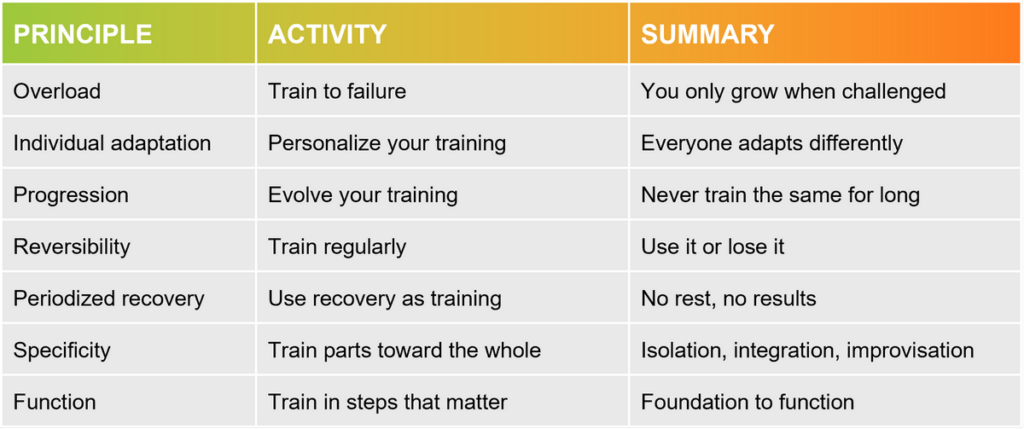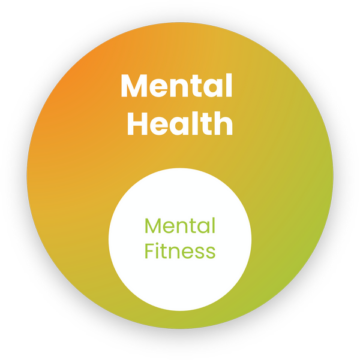Learn about the evolution of a mental fitness approach that works under pressure because it trains under pressure.
MENTAL HEALTH THROUGH MENTAL FITNESS
It’s not what you know that makes you fit; it’s how you translate what you know into action.
ZOOMING IN ON MENTAL FITNESS
Generally speaking, a fitness level depends on the functional applicability of skills and attributes under pressure. Again, like physical skills and attributes, mental skills and attributes improve with training and deteriorate without it. The distinction between skills and attributes facilitates the choice of appropriate methods to address them:
Mental skills
- Skills are abilities that take time to develop, and that take time to deteriorate. They require training that progresses in technical difficulty until they reach a functional level that translates to performance.
- Some mental skills are more operative, i.e., with our senses focused on the here and now, and other mental skills are more contemplative, with our thoughts, emotions, or imagination taking us into the past or future.
- Being operative and contemplative are the two states of mind our attention can be in as we go though life. It requires skills to switch between these two states at will and regulate the depth of the experience.
Examples: the ability to calm thoughts and emotions, relax the body, reason with clarity, visualize vividly, or focus deeply.
Mental attributes
- Attributes are temporal cognitive or affective properties: they are either relatively constant or can change rapidly, but they do not without a training-based adaptation response.
- Cognitive attributes can be characterized as perspectives, beliefs, or convictions.
- Affective attributes are emotions that can be more or less positive or negative and are often associated with specific cognitive attributes.
Examples: stubbornness, determination, confidence, gratitude, joy, open-mindedness, mindsets (fixed, growth).
Mental fitness, particularly the level of mental skills and attributes, is a strong determinant of mental health and the ability to thrive under pressure (perform to potential). To develop skills and attributes, you must go beyond learning and start training. Although fitness is often used synonymously with training in everyday use, it is more accurate to see training as the vehicle to achieve fitness. Let’s have a look at how that works for mental fitness.
REDEFINING MENTAL TRAINING
The problem with most mental training is that it is not training. Training oneself (rather than others), in a general context, can be defined as developing fitness related to functional competencies. As such (and as mentioned earlier), it is the activity that results in fitness. However, in exercise physiology, specific criteria determine whether an activity, such as a set of exercises, should be considered training. These criteria are sometimes referred to as training principles, and the following list presents the main ones in a logical order.

A careful look at this list exposes the problem of referring to typical clinical and sports psychology activities as training: most training principles do not apply. In other words, if exercises are not evolved systematically in workouts over a period of time (progression) and do not put functional stress (overload) on a specific functional capacity (function, specificity), there is no training.
For example, many athletes (and coaches) refer to journaling as mental training. First, journaling addresses cognitive attributes (what you realize about yourself) and not specific mental skills (except perhaps the skill to articulate experiences). Furthermore, nothing about journaling involves any training principle.
Another example is the practical homework given by psychologists. Or, similarly, guided meditations in meditation apps. Unless the exercises progress systematically to challenging levels, are built up in small increments toward function, and are repeated over time to address individual needs, they should not be considered training. This does not mean guided meditations are useless; it just means that doing them without following training principles will not lead to a mental fitness that is functional under pressure.
CHANGING THE PARADIGM
While mental health support has become a hot topic and addressing issues has become less and less stigmatized, the problem is that we are still addressing issues, not preventing them. We are reactive and therapeutic, with interventions that are almost invariably gentle and supportive. Simply put, the paradigm in mental health is still to wait until we break and then limit the damage. This is very different for physical health: we train to prevent issues and ensure our fitness increases over time by continuously increasing the training stimulus.
The paradigm in mental health is still to wait until we break.
The current answer to our mental health crisis is more therapists and more 24/7 support apps. Throw in the occasional inspiring video or motivational talk, and it may seem we’re on the right track. However, epidemiologic reports of mental illness incidence paint a different picture.
It’s time to change the paradigm for mental health and learn from physical health. It’s time to integrate exercise physiology into psychology and move the emphasis from therapy to training. From diagnostics to early screening. From reactive to proactive. This requires a shift in thinking from everyone. For therapists and performance coaches, providing training is distinctly different from giving therapy. For someone struggling with issues, a training regimen is very different from a consulting session. And lastly, for someone without mental issues, including mental fitness training in their weekly routine is not the same as simply hitting the gym and pumping some iron. This is why it is crucial to have screening and training tools that fit inside the toolbox of therapists and coaches and, at the same time, can also integrate easily into existing (fitness) activities for individual users. One such tool is Flow 255® by 2Mynds.
Flow 255® – AN INNOVATIVE APPROACH TO MENTAL FITNESS
2Mynds has pioneered a unique mental fitness training approach: Flow 255®. The proprietary solution integrates exercise physiology into mental fitness training, delivering testing, training, and application content with a gamified online ecosystem. Flow 255® refers to managing two states of mind with five core skills and five core perspectives. Training is centered around mind-body workouts that isolate techniques in consecutive mental and physical exercise flows that progress to overload and are eventually used in an integrative flow. Besides workouts, mental fitness is assessed and tracked with a proprietary test (SPE-20®) that generates a mental fitness index. Special courses help those who want to dive deeper into the why and are especially useful for injured athletes. Video series and guided meditative audio clips take the acquired skills and attributes to a new dimension in practical routines. Essentially, Flow 255® provides athletes with an online mental fitness gym that addresses mental fitness in the same way as physical fitness: with the proper training.
MENTAL FITNESS TRAINING
FOR ATHLETES
Junior Athletes
Beginning mental fitness training from an early stage in life as an athlete provides a stable and promising foundation for future optimal performance. These young athletes’ ability to respond and act rationally in light of adversity will be easier to achieve when their minds are not hardwired to react poorly. High-performance junior athletes like this need a solid mental fitness foundation to thrive in their competitive events and life outside of sports. High-performance academies can fully customize their Flow 255® platform package, from a team-based solution that resembles top collegiate and pro sports packages to a simple support system that guides individual students in the academy.
Collegiate Athletes
Student-athletes at the collegiate level experience immense pressure both in and outside the sports arena. Optimizing personal athletic performance while maintaining a high standard for academics and professional accolades is not an easy task. 2Mynds’ Flow 255® platform supports mental fitness in college athletics in the broadest way possible, from providing athletes with the training tools to optimize their mental health and performance to empowering coaches and sports psychologists with a scalable mental fitness solution.
Professional Athletes
The pressure of personal and professional obligations stemming from athletic performance can be incredibly demanding and mentally exhausting without the proper mental fitness techniques. 2Mynds’ Flow 255® ecosystem provides pro athletes and their teams with mental fitness analytics to assess their needs and progressive workouts, ensuring that mental skills translate to critical action under pressure. Making preventative training an integral part of day-to-day practice, we help pro athletes maintain their mental health.
Examples Of Mental Fitness Training In Real Life:
As Seen On





